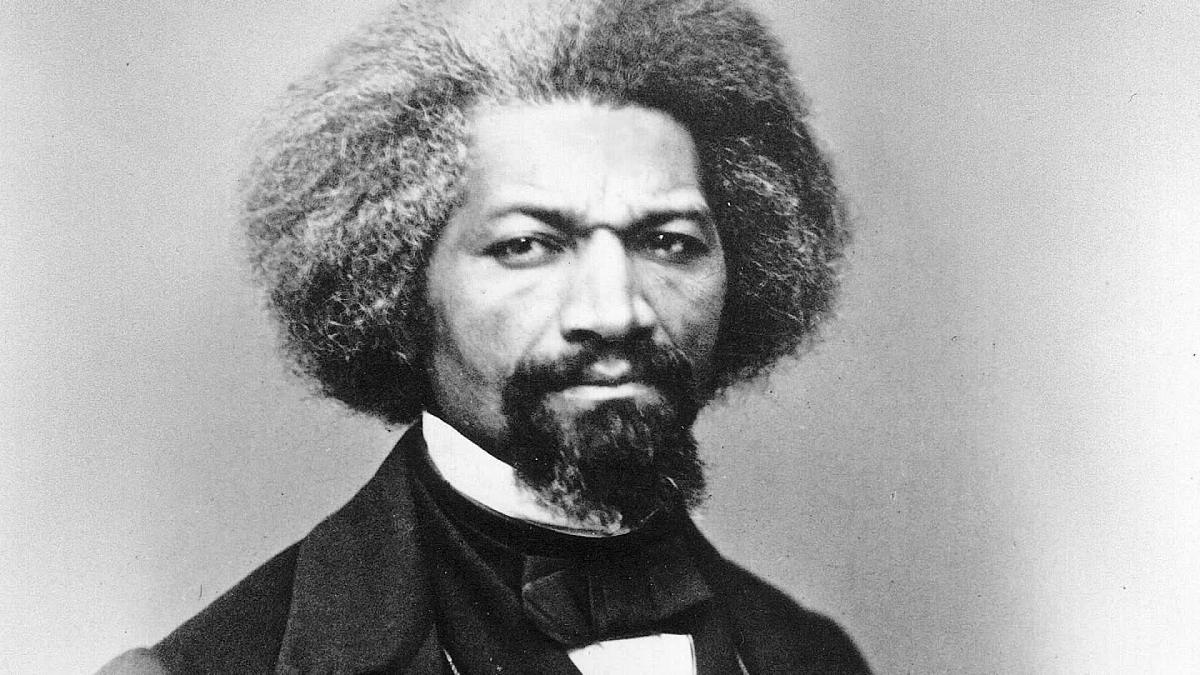February 14, 2023
Frederick Douglass Was My Founding Father
Director of Policy and Program for Racial Justice

This is the second piece in a month-long blog series that celebrates Black History Month by highlighting the contributions of Black thinkers and leaders to the development of American constitutional thought.
Only two national holidays celebrate individual Americans. Presidents Day honors George Washington (born February 22nd) and Abraham Lincoln (born February 12th) and Martin Luther King Jr. Day honors Dr. King (born January 16th) and his contributions to civil rights. There is no corresponding holiday honoring Frederick Douglass, a towering figure in U.S. history, who celebrated his birthday on February 14th.[i]
Washington is lauded as the “father of the nation,” Lincoln is credited with preserving it, and King is praised for holding it to its constitutional ideals. And yet, we would do well to pay equal or arguably greater attention to Douglass, the figure, perhaps more than any other, who laid the intellectual and political foundation that put America on course to become a multiracial democracy.
Consider some counterfactuals. What if we’d had Lincoln without Douglass? Although Lincoln personally opposed slavery, he was far from an abolitionist. For most of his career, Lincoln recoiled at the idea of free Blacks living alongside whites (“What next? Free them, and make them politically and socially, our equals?”) and declared his opposition to Black people having the right to vote, to serve on juries, and to hold office.
Until the eve of the Civil War, Lincoln did not imagine that slavery would end in the United States within his lifetime. It’s not hard to imagine that, without Douglass (and other abolitionists) pushing him and pushing the slavery debate to its boiling point, Lincoln would likely have steered the nation towards another 50 years of Southern appeasement.
Without Douglass, even Dr. King’s legacy would be in doubt. There could be no March on Washington without the Emancipation Proclamation, which preceded it 100 years prior. There could be no Civil Rights Act or Voting Rights Acts without the Fourteenth and Fifteenth Amendments, which forever transformed American conceptions of citizenship, equal protection, and suffrage.
Of course, these counterfactuals share a fatal flaw. They rely too heavily on the Great Man theory of history, which tends to overemphasize the contributions of individuals—usually white, male ones—in shaping the course of human events, underestimating the way events shape us.
We can’t know for sure whether, in the absence of Douglass, abolition and equality for Black Americans would have progressed more or less quickly. We can only point to the indelible fingerprints that Douglass did leave on the nation’s psyche—and the tools and methods he left for future generations of freedom seekers.
Progressives are generally familiar with Douglass’ history as a fierce critic of injustice, underlining the flagrant inconsistencies between America’s founding myths and its practices. It’s become something of a ritual in social justice circles. Every Independence Day, someone will resurface Frederick Douglass’s iconic question: “What to the Slave is the 4th of July?” and its equally iconic answer—"a day that reveals to him, more than all other days in the year, the gross injustice and cruelty to which he is the constant victim.”
Fewer are familiar with Douglass’ full-throated defense of the Constitution as a “glorious liberty document,” within the same speech and the positive vision of what America could be that he strived to promote throughout his life.
Douglass described the Constitution as a document with “principles and purposes entirely hostile to the existence of slavery,” a constitutional vision set him apart within contemporary discourse. Meanwhile, Lincoln held the more widely shared viewpoint that the Constitution restrained the federal government from abolishing slavery. On the eve of the Civil War, as a last-ditch effort to compromise with the South, Lincoln supported a constitutional amendment that would have made this interpretation explicit, permanently enshrining slavery in the Constitution.
Douglass’s approach was also distinct from that of white abolitionist radicals, led by William Garrison who denigrated the Constitution a “pact with hell” because it contained provisions protecting the power of slaveowners. Because he considered the republic irreparably tainted, Garrison refused to engage in electoral politics and called for dissolution of the Union. While this stance was in theory more radical than Douglass’ (and perhaps more accurately reflected the founders’ intentions), in practice, both Lincoln’s and Garrison’s interpretations conceded that there would be no abolition of Southern slavery in the foreseeable future.
It was certainly not lost on Douglass that many of the so-called founding fathers had owned slaves or that oblique references to slavery were peppered through the document.[ii] He simply refused to let these inconveniences stand in the way of using the Constitution as an instrument to push for justice and equality—especially when more favorable readings were available. As Douglass put it, “nothing but absolute necessity, shall, or ought to drive me to such a concession to slavery.”
Rather than focusing on the founder’s intentions, Douglass centered the polity and purposes set forth in the Constitution’s preamble. Douglass noted that, by its own terms, the Constitution’s protections transcended lines of race, gender, or even citizenship.
"We, the people"—not we, the white people—not we, the citizens, or the legal voters—not we, the privileged class, and excluding all other classes but we, the people; not we, the horses and cattle, but we the people—the men and women, the human inhabitants of the United States, do ordain and establish this Constitution.”
Douglass found similar support for abolition in the terms of the Fourth, Fifth and Eighth Amendments, which refer to persons without reference to color or other status.
Centering his own common sense and lived experience, Douglass declined to give anyone else, even the Supreme Court, the last word on interpreting the Constitution. In the aftermath of the Supreme Court’s 1857 Dred Scott decision, in which the Court declared that Black Americans were not citizens and were therefore ineligible for the Constitution’s protections, Douglass’ reminded his listeners, “the Supreme Court of the United States is not the only power in this world.”
Incredibly, despite the devastating ruling, Douglass declared that his hopes for abolition were “never brighter” and predicted that “this very attempt to blot out forever the hopes of an enslaved people may be one necessary link in the chain of events preparatory to the downfall and complete overthrow of the whole slave system.” Even more incredibly, he was right.
Although Douglass’ interpretation of the Constitution was not widely shared before the war, it gained support over the course of the Civil War and in its aftermath. Under heavy pressure from Douglass and the abolitionists, Lincoln issued the Emancipation Proclamation on January 1, 1863, even though in the leadup and aftermath of the proclamation, many in the legal community expressed serious doubts of his constitutional authority to do so.
By 1865, Douglass’ expansive view of the anti-slavery constitution had found considerable support in Congress. Both houses passed a bill that would require Southern states to abolish slavery in order to be readmitted to the Union, claiming the requirement was within the United States’ constitutional authority “to guarantee a republican form of government to every state.” While Lincoln would veto the bill as unconstitutional, it set the tone for Radical Reconstruction, an unprecedented federal effort to secure the rights of Black Americans through a mix of legislation and constitutional amendments.
Douglass’ theory of the Constitution was most readily reflected in the language and text of the Fourteenth Amendment, which famously extended the equal protection of the law to “all persons” and enshrined the principle of birthright citizenship in the Constitution, overturning once and for all the shadow of Dred Scott and planting the seeds for a truly multiracial democracy.
One can find echoes of the eighteenth century’s battle over the potential and limitations of the Constitution in current debates. Analysts report that the United States is at its most divided since the Civil War. The nation reels in the wake of Dobbs v. Jackson Women’s Health, a deeply polarizing decision which, like Dred Scott, relied upon the purported intentions of the founders to limit constitutional rights.
A considerable segment of progressives and radicals believe that our country’s institutions are irreparably tainted and should be cast off entirely. Meanwhile, progressives in positions of power frequently bemoan the injustices that they would like to see eliminated, but point to constitutional or institutional limits that prevent them from taking action.
In this moment of national crisis and opportunity, President Biden speaks often about “restoring the soul of the nation” and has made a point of referring back to Lincoln, including in his State of the Union address. If we are to repair the nation’s divides and restore its soul, however, it’s not Lincoln whom we should look to, but to Douglass.
____________
[i] Like many people born into slavery, Douglass never knew the exact day of his birth. He chose to celebrate his birthday on Valentine’s Day based on one of his few clear memories of spending time with his mother—her presenting him with a heart shaped piece of cake. In his life as in his politics, he chose to place love at the center of everything.
[ii] Some examples include clauses that prohibited Congress from ending the African slave trade before 1808 but did not require that it ever be ended, counted slaves for the election of the president through the electoral college and the three-fifths clause, and, guaranteed that fugitive slaves would be returned to their owners.
____________
 Taonga Leslie is ACS' Director of Policy and Program for Racial Justice.
Taonga Leslie is ACS' Director of Policy and Program for Racial Justice.
Constitutional Interpretation, Equality and Liberty, Racial Justice




